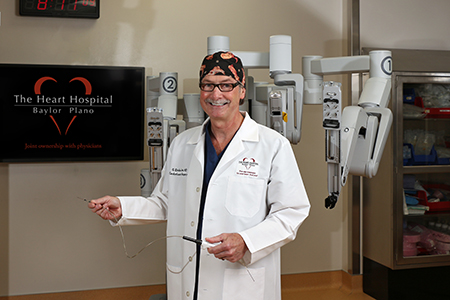
Using a medical laser and a robotic surgical system, a cardiothoracic surgeon on the medical staff at The Heart Hospital Baylor Plano (THHBP) created 30 new holes, or channels, in the heart of a 58-year-old Dallas area man. The new channels relieved the intense chest pain – known as angina – endured by the patient for many years.
Angina occurs if an area of the heart muscle doesn't get enough oxygen-rich blood. “These new channels created by the Holmium: YAG Laser System laser in the heart muscle allow more blood flow to the heart, eliminating some or all angina pain,” explained Dr. Kim Jett, medical director, thoracic robotics, THHBP. The procedure, transmyocardial laser revascularization (TMR), can improve a patient’s quality of life when the intense chest pain can’t be treated by medications, stents or open heart surgery.
TMR may be the last option for patients with uncontrollable angina, added Dr. Jett.
THHBP clinicians believe this is the first robotic TMR performed in Texas. The da Vinci® Surgical System is a tool that allows cardiothoracic surgeons to have 3-D visualization of the surgical area and make use of tiny (miniature) surgical instruments inside the patient’s body. Incisions made by the da Vinci robot are typically about the size of a nickel. After making the incision in the patient’s side, the surgeon manipulated the robotic arms from the control panel, placing the laser inside the patient’s chest cavity between his ribs. The surgeon created the new channels through the wall of the heart’s left ventricle using the Holmium: YAG Laser System laser.
Since the mid-September two-hour surgery, the patient has not experienced angina, a painful condition he had endured since the late 1990s. He was discharged from the hospital on his second postoperative day.
According to the National Heart, Lung and Blood Institute, experts believe that nearly 7 million people in the U.S. suffer from angina. The condition occurs equally among men and women.
Angina may feel like pressure or squeezing in the chest. The pain also can occur in the shoulders, arms, neck, jaw, or back. Angina pain may even feel like indigestion.
# # #
Notice Regarding Physician Ownership: THE HEART HOSPITAL Baylor Plano is a hospital in which physicians have an ownership or investment interest. The list of the physician owners or investors is available to upon request. Physicians are members of the medical staff at one of Baylor Health Care System's subsidiary, community or affiliated medical centers and are neither employees nor agents of those medical centers, THE HEART HOSPITAL Baylor Plano or Baylor Health Care System.
MEDIA CONTACT:
Susan Hall
susanh@baylorhealth.edu
(214) 820-1817
About Baylor Scott & White Health
As the largest not-for-profit health system in the state of Texas, Baylor Scott & White promotes the health and well-being of every individual, family and community it serves. It is committed to making quality care more accessible, convenient and affordable through its integrated delivery network, which includes the Baylor Scott & White Health Plan, Baylor Scott & White Research Institute, the Baylor Scott & White Quality Alliance and its leading digital health platform – MyBSWHealth. Through 51 hospitals and more than 1,200 access points, including flagship academic medical centers in Dallas, Fort Worth and Temple, the system offers the full continuum of care, from primary to award-winning specialty care. Founded as a Christian ministry of healing more than a century ago, Baylor Scott & White today serves more than three million Texans. For more information, visit: BSWHealth.com
